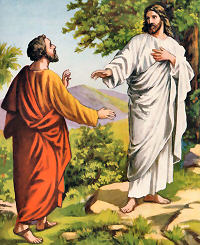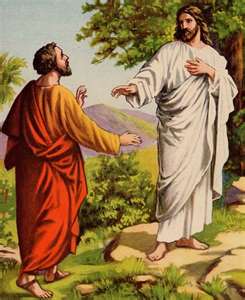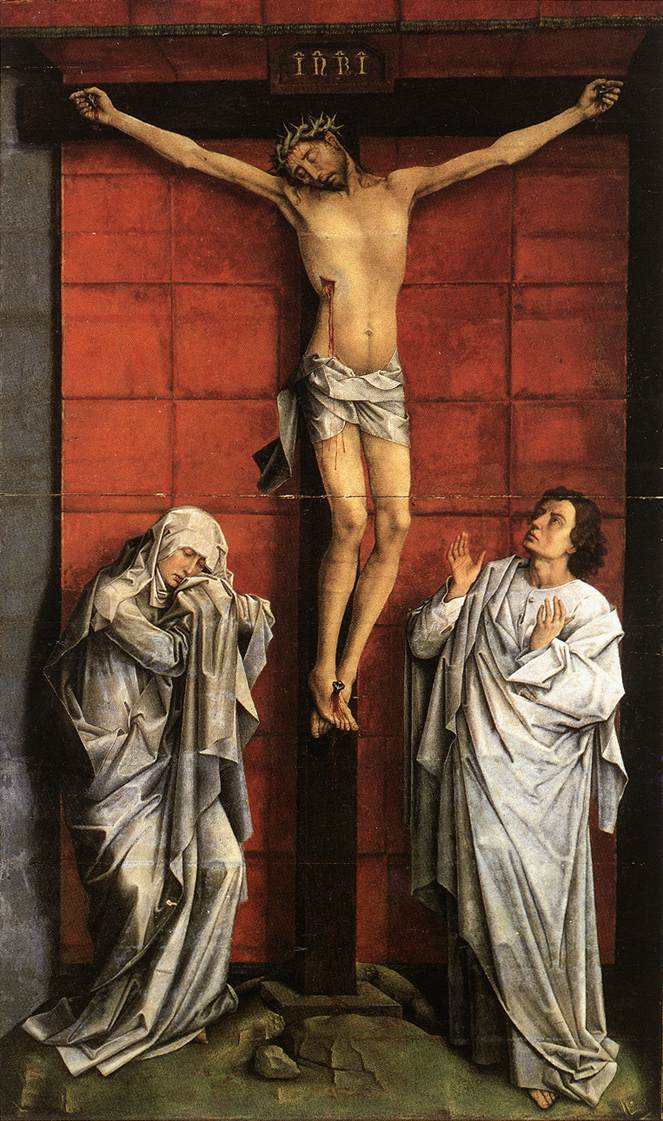
The Gospel today sets forth the biblical basis for the Office of Peter, the Office of the Papacy, for Peter’s successors are the Popes. The word “Pope” is simply an English version (via Anglo-Saxon and Germanic tongues) of the word “papa.” The Pope is affectionately called “Papa” in Italian and Spanish as an affectionate indication that he is the father of the family, the Church.
That Peter receives an office, and not simply a charismatic designation we will discuss later. As to certain objections regarding the office of the Papacy, we will also deal later. But for now lets look at the basic establishment of the Office of Peter in three steps.
I. The Inquiry that Illustrates – The text says, Jesus went into the region of Caesarea Philippi and he asked his disciples, “Who do people say that the Son of Man is?” They replied, “Some say John the Baptist, others Elijah, still others Jeremiah or one of the prophets.” He said to them, “But who do you say that I am?“
It should be noted that, in asking these questions, Jesus is not merely curious about what people think of him. He seems, rather, to be using these questions as a vehicle by which to teach the apostles, and us, about how the truth is adequately revealed and guaranteed.
Jesus’ first two questions reveal the inadequacy of two common methods:
1. The Poll - Jesus asks who the crowds say he is. In modern times we love to take polls, and many moderns put a lot of weight in what polls say. More than just politics, many people, Catholics among them, like to point out that X% of Catholics think this, or that, about moral teachings, or doctrines and disciplines. It is as if the fact that more than 50% of Catholics think something, it must be true, and that the Church should change her teaching based on this.
But, as this gospel makes clear, taking a poll doesn’t necessarily yield the truth. In fact ALL the assertions of the crowd were wrong, no matter what percentage thought them. Jesus is not John the Baptist, Elijah, Jeremiah, or one of the prophets redivivus. So, running the Church by poll taking or democracy seems not to be the model that works.
2. The Panel - Jesus, having taught this implicitly, now turns to a panel of experts, a “blue ribbon committee,” if you will. He asks the twelve, “Who do you (apostles) say that I am?” Here we simply get silence. Perhaps they were looking around like nervous students in a classroom not wanting to answer, lest they look like a fool. The politics on the panel leads not to truth, but to a kind of self-serving, politically correct silence.
That Peter finally speaks up is true. But, as Jesus will say, he does not do this because he is a member of the panel, but for another reason altogether.
Hence the blue ribbon panel, the committee of experts, is not adequate in setting forth the religious truth of who Jesus is.
And through this line of questioning, Jesus instructs through inquiry. Polls and panels are not adequate in yielding the firm truth as to his identity. All we have are opinions, or politically correct silence. Having set forth this inadequacy, the Gospel now presses forth to describe the plan of God in adequately setting forth the truths of faith.
II. The Individual that is Inspired - – The text says, Simon Peter said in reply,”You are the Christ, the Son of the living God.” Jesus said to him in reply, “Blessed are you, Simon son of Jonah. For flesh and blood has not revealed this to you, but my heavenly Father.
We are taught here not merely that Peter spoke, but also how he came to know the truth. Jesus is very clear to teach us that Peter spoke rightly, not merely because he was the smartest, (he probably wasn’t), or because some one else told him, (Jesus is clear that flesh and blood did not reveal this to him), and not merely because because he guessed, and just happen to get the right answer. Jesus teaches that Peter came to know the truth and speak it because God the Father revealed it to him. God the Father inspires Peter. There is a kind of anointing at work here.
So here is God’s methodology when it comes to adequately revealing and guaranteeing the truths of the faith: he anoints Peter.
It’s not polls, or panels that God uses, it’s Peter.
And while truths may emerge in the wider Church, reflecting what is revealed, it is only with Peter and his successors that such views can be definitively set forth, and their truth adequately guaranteed. Thus, the other apostles are not merely bypassed by God, but He anoints Peter to unite them and give solemn declaration to what they have seen and heard.
The Catechism says of Peter and his successors, the popes:
When Christ instituted the Twelve, he constituted [them] in the form of a college or permanent assembly, at the head of which he placed Peter, chosen from among them….The Lord made Simon alone, whom he named Peter, the “rock” of his Church. He gave him the keys of his Church and instituted him shepherd of the whole flock. The office of binding and loosing which was given to Peter was also assigned to the college of apostles united to its head. This pastoral office of Peter and the other apostles belongs to the Church’s very foundation and is continued by the bishops under the primacy of the Pope.
The Pope, Bishop of Rome and Peter’s successor, is the perpetual and visible source and foundation of the unity both of the bishops and of the whole company of the faithful. For the Roman Pontiff, by reason of his office as Vicar of Christ, and as pastor of the entire Church has full, supreme, and universal power over the whole Church, a power which he can always exercise unhindered.”
The college or body of bishops has no authority unless united with the Roman Pontiff, Peter’s successor, as its head. As such, this college has supreme and full authority over the universal Church; but this power cannot be exercised without the agreement of the Roman Pontiff. The college of bishops exercises power over the universal Church in a solemn manner in an ecumenical council. But there never is an ecumenical council which is not confirmed or at least recognized as such by Peter’s successor. (Catechism of the Catholic Church, #s 880-884 selected)
All these truths point back to this moment when we see how God himself chooses to operate.
And note too, the dimension of faith we are called to have. We are to assent to the Pope’s teaching and leadership not merely because we think he is smarter, or because it might happen that he had power, riches other worldly means that might impress us or compel us to assent. Rather, no, we assent to the Pope because, by faith, we believe he is inspired by God. It is not flesh and blood in which we put our trust, it is God himself, whom we believe has acted on our behalf by anointing someone to affirm the truth, and adequately guarantee that truth to be revealed by God.
And this then leads to the final stage wherein Jesus sets forth a lasting office for Peter.
III. The Installation that is Initiated - The text says, And so I say to you, you are Peter, and upon this rock I will build my Church, and the gates of the hell shall not prevail against it. I will give you the keys to the kingdom of heaven. Whatever you bind on earth shall be bound in heaven; and whatever you loose on earth shall be loosed in heaven.”
Jesus does not merely praise Simon for a moment of charismatic insight. He goes further, and declares that he will build his very Church upon Simon, and thus he calls him, Peter (Rock). And here too, he does not merely mean this is a personal gift or recognition that will die with Peter. In giving him the keys, he is establishing an office, not merely indicating a personal promotion for Peter. This will be God’s way of strengthening and uniting the Church. In Luke’s Gospel Jesus says more of this:
Simon, Simon, behold, Satan demanded to have you, all that he might sift you all like wheat, but I have prayed for thee, Peter, that thy faith may not fail; and when thou hast turned again, strengthen thy brethren. (Luke 22:31)
Hence, it is clear once again that God’s plan for the Church is to strengthen one man, Peter and his successors, that in turn the whole Church may be strengthened and united.Thus the Lord Jesus establishes not only Peter, but also his office. This is God’s vision and plan for his Church.
It is true many have objected to this teaching. There is no time here to do a full apologetical reply to every objection. But frankly most of the objections amount to a kind of wishful thinking by some, who want this text to mean something other than what it plainly means. Nothing could be clearer that the fact that Jesus is establishing Peter and an office which will serve as a foundation for the unity and strength of his Church.
Some object that within verses Peter will be called “satan” and will later deny Christ. But Jesus knew all this, and still said and did what he does here.
Others object that Jesus is head and foundation, that he is the Rock. True enough, but apparently Jesus never got the objectors’ memo, for it is he himself who calls Peter rock, and establishes him with the authority to bind and loose. It is also true that both Jesus and Peter can be head and rock, in terms of primary and secondary causality (more on that HERE). And yet again, that Peter and his successors are head and rock by making visible and being the means through which Christ exercises his headship and foundational aspect.
Finally, to return to the title of this post, “If no one is Pope, EVERYONE is pope!” For the fact is, without a visible head, there is no principle on earth for unity in the Church. The experiment tried to replace the Pope with scripture and gave it sole authority. But they cannot agree on what Scripture says, and have no earthly way to resolve their conflicts. While they say that authority resides in Scripture alone, the fact is, in claiming the anointing of the Holy Spirit and thus the ability to properly interpret Scripture, they really place the locus of authority within themselves, and become the very pope they denounce. Having denied that there is a Pope they become one themselves. If no one is pope, everyone is pope.
I have read that some objectors think Catholics arrogant in asserting that we have a Pope whom we trust to be anointed by God to teach us without error on faith and morals. But what is more arrogant, to claim there is a Pope other than me, or to in fact act like one myself?
In the end, the experiment is a failed one. Many estimates place the number of denominations as high as 30,000. I personally think this is slightly exaggerated, but not much. They all claim the Scriptures as their source of truth but differ on many, very essential matters, such as the necessity of baptism, once saved always saved, sexual morality, authority etc. When they cannot resolve things they simply subdivide. There is an old joke, told even among protestants that goes:
Once I saw this guy on a bridge about to jump. I said, “Don’t do it!” He said, “Nobody loves me.” I said, “God loves you. Do you believe in God?” He said, “Yes.” I said, “Are you a Christian or a Jew?” He said, “A Christian.” I said, “Me, too! Protestant or Catholic?” He said, “Protestant.” I said, “Me, too! What franchise?” He said, “Baptist.” I said, “Me, too! Northern Baptist or Southern Baptist?” He said, “Northern Baptist.” I said, “Me, too! Northern Conservative Baptist or Northern Liberal Baptist?” He said, “Northern Conservative Baptist.” I said, “Me, too! Northern Conservative Baptist Great Lakes Region, or Northern Conservative Baptist Eastern Region?” He said, “Northern Conservative Baptist Great Lakes Region.” I said, “Me, too!” Northern Conservative Baptist Great Lakes Region Council of 1879, or Northern Conservative Baptist Great Lakes Region Council of 1912?” He said, “Northern Conservative Baptist Great Lakes Region Council of 1912.” I said, “Die, heretic!” And I pushed him over.
A strange little joke, and not entirely fair since most Protestants of different denominations I know get along fine personally. But the truth is, the denominations disagree over many very essential things. The Protestant experiment is a failure that leads only to endless divisions. The Church needs a visible head. The Bible alone does not suffice, for there are endless disagreements on how to interpret it. Some one must exist to who all look and agree that he will resolve the differences after listening.
Jesus has installed an individual in this role to manifest his office of rock and head and that individual is Peter and his successors.
Here’s a light-hearted video I put together commemorating the Pope’s many visits to unite and strengthen us.





 21st
21st 





